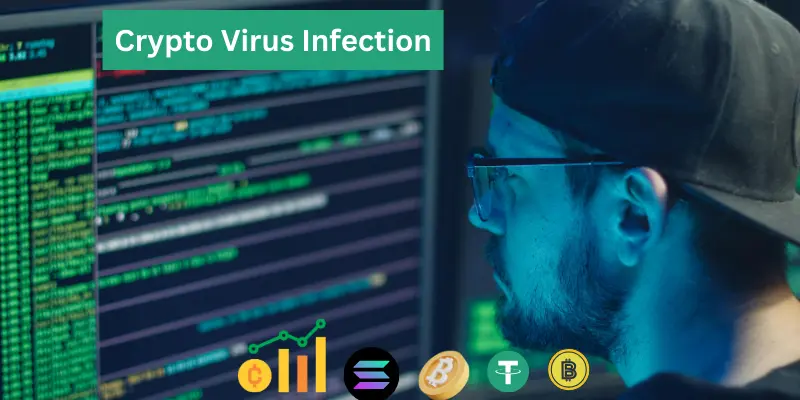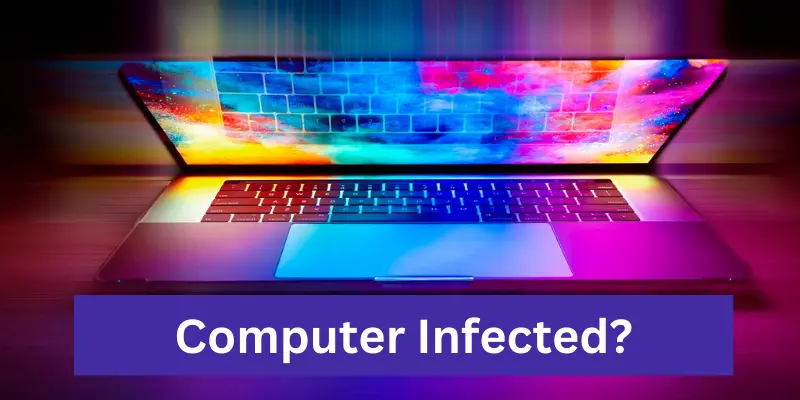Signs of Crypto Virus Infection & How to Prevent It
Published: 01 Jan 2025
In today’s digital world, securing your data is more important than ever. One growing threat to your files is the crypto virus—malicious software that can lock your files and demand a ransom to unlock them.
This attack can be devastating, but the good news is that with the right knowledge, you can protect yourself from these threats. In this article, we’ll explain what a crypto virus is, how it spreads, how to spot an infection, and most importantly, how to protect yourself.

What is a Crypto Virus?
A cryptovirus, often known as ransomware, is a type of malware designed to encrypt your files. Encryption makes your files unreadable unless you have the decryption key—something only the hacker who launched the attack can provide. Once your files are encrypted, you’ll typically see a message on your screen demanding a ransom in exchange for the decryption key. If you don’t pay up, you may never see your files again. explore blockchain types
This type of virus is especially dangerous because it often targets important documents such as photos, videos, work files, and personal data. If you don’t have a backup of your data, paying the ransom might seem like the only option. However, there’s no guarantee that the attacker will give you access to your files after you’ve paid.
How Do Crypto Viruses Infect Your Computer?
Crypto viruses can infect your computer in several ways. Understanding how they spread can help you take the right precautions to avoid falling victim to an attack. CryptoLocker
1 Phishing Emails
Phishing is one of the most common ways that crypto viruses get into your system. A phishing email is a fake email that looks like it’s from a legitimate source, such as a bank, a company you do business with, or even a friend. These emails often contain malicious links or attachments that, when clicked, will download the crypto virus onto your computer. Blockchain Scalability Explained
Phishing emails are designed to look as real as possible, so they can be tricky to spot. Always double-check the sender’s email address, look for spelling or grammar errors, and avoid clicking on any links or attachments from unfamiliar sources.
2 Infected Software Downloads
Another way that crypto viruses spread is through infected software downloads. If you download software from unreliable or untrustworthy sources, you might unknowingly install a crypto virus on your system. This is why it’s important to only download software from reputable websites.
Additionally, cracked software or torrents often come bundled with malicious programs. These illegal copies of software may seem like a good deal, but they can put your computer at serious risk. Stick to official channels and avoid downloading anything from suspicious sources.
3 Exploiting Weak Security
Crypto viruses often take advantage of vulnerabilities in outdated software. If your operating system or software isn’t up to date, hackers can exploit these weaknesses to get access to your device. This is why regular updates are crucial in keeping your system secure. Even a small security gap can be enough for a hacker to infect your device with a cryptovirus.

Is Your Computer Infected?

Crypto viruses can be difficult to detect at first, as they often work quietly in the background. However, there are some clear signs that your system might be infected. If you notice any of the following, it’s time to take action:
1 Locked Files
One of the most obvious signs of a crypto virus infection is when your files become locked. When a virus encrypts your files, they become unreadable, and you might see strange file extensions like .encrypted or .locked. A ransom note might appear on your screen, instructing you to pay a fee in cryptocurrency, such as Bitcoin, to get your files back.
2 Ransom Notes
After the virus encrypts your files, it will usually display a ransom note on your screen. This message often threatens to delete your files permanently if you don’t pay up within a certain timeframe. The note will typically include payment instructions and may even provide an email address or contact information for the attacker.
3 Slow Performance
In some cases, your system’s performance may slow down dramatically once it’s infected with a cryptovirus. This happens because the virus is running in the background, encrypting your files and using up system resources. If your computer suddenly starts running sluggishly, especially when opening or saving files, it could be a sign of an infection.
What should you do if you receive a suspicious email with an attachment?
A) Open the attachment to see what it is.
B) Ignore the email and delete it.
C) Respond and ask if it’s safe to open.
(Correct answer: B)
Why is backing up your files important in protecting against crypto viruses?
A) So you can recover your files if they get locked.
B) To store extra copies of all your data.
C) To make your computer run faster.
(Correct answer: A)
What does antivirus software do to protect your computer?
A) It removes viruses and blocks potential threats.
B) It speeds up your internet connection.
C) It deletes all old files.
(Correct answer: A)
How to Protect Yourself from Crypto Viruses:
- Use antivirus software to catch threats early.
- Back up your files regularly (cloud or external drive).
- Be careful with suspicious emails and links.
- Keep your apps and system updated for better security.
- Avoid downloading from untrustworthy sites.
- Turn on two-factor authentication for extra protection.
- Don’t open attachments from unknown senders.
What to Do If You’re Infected with a Crypto Virus
If you realize your computer has been infected with a crypto virus, it’s important to act quickly to minimize the damage. Here’s what you should do:
Don’t Pay the Ransom
Although it might be tempting, don’t pay the ransom. There’s no guarantee that the hacker will unlock your files, and paying only encourages them to keep attacking others. If you’re facing a cryptovirus attack, paying should be your last resort.
Disconnect from the Internet
Disconnect your computer from the internet to stop the virus from spreading to other devices or communicating with the attacker’s server. This might prevent further damage and give you time to figure out the next steps.

Use Antivirus or Anti-Malware Software
Run a full system scan with your antivirus software to detect and remove the virus. If your current antivirus program doesn’t detect the threat, consider using a specialized anti-ransomware tool.
Restore Your Files from Backups
If you have recent backups, restore your files after the virus has been removed. This is why regular backups are so important—it allows you to recover your data without giving in to ransom demands.
Get Professional Help
If you’re unable to remove the virus on your own or recover your files, consider seeking help from a cybersecurity professional. They can assist with removing the malware and, in some cases, help recover encrypted files.
Conclusion:
Crypto viruses are a real threat, but you can easily protect yourself by following these simple steps. Keep your software updated, back up your files, and always be cautious online. By staying aware and prepared, you can keep your data safe and avoid falling victim to these attacks. Stay smart and stay secure.
A: Paying the ransom doesn’t guarantee that you’ll get your files back. In fact, it may encourage hackers to target you again or attack others. It’s better to try other methods to recover your files, like restoring from a backup or getting professional help..It
A: Yes, it’s possible! If you have a backup, you can restore your files. If not, you can try using antivirus software to remove the virus, and in some cases, data recovery tools might help recover some files.






